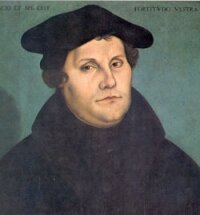 The theological system of any of the churches of western Christendom that separated from the Roman Catholic Church during the Reformation in the 16th century.
The theological system of any of the churches of western Christendom that separated from the Roman Catholic Church during the Reformation in the 16th century.Protestantism is a movement within Christianity, representing the splitting away from the Roman Catholic Church during the mid-to-late Renaissance in Europe —a period known as the Protestant Reformation.
Commonly considered one of the three major branches of Christianity (along with Roman Catholicism and Eastern Orthodoxy); the term "Protestant" represents a diverse range of theological and social perspectives, churches and related organizations.
Originally, "protestant" meant "to be a witness for something" rather than "to be against something", as the current popular interpretation of the word seems to imply. The prefix pro means "for" in Latin. The Latin adjective protestans refers to "a person who gives public testimony for something or who proves or demonstrates something". The term Protestant originally applied to the group of princes and imperial cities who "protested" the decision by the 1529 Diet of Speyer to reverse course, and enforce the 1521 Edict of Worms. The 1521 edict forbade Lutheran teachings within the Holy Roman Empire. The 1526 session of the Diet had agreed to toleration of Lutheran teachings (on the basis of Cuius regio, eius religio) until a General Council could be held to settle the question, but by 1529, the Catholic forces felt they had gathered enough power to end the toleration without waiting for a Council.


No comments:
Post a Comment